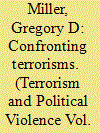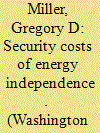| Srl | Item |
| 1 |
ID:
080344


|
|
|
|
|
| Publication |
2007.
|
| Summary/Abstract |
Much of the recent debate among policymakers and in recent scholarship focuses on how states should respond to terrorism: whether they should use harsh policies to punish terrorists and thus deter future acts, or concentrate on root causes and reduce incentives to use terrorism. Often ignored in this discussion are the characteristics that distinguish terrorist groups from one another, and that influence the effectiveness of a state's actions. This article examines group motivation - national-separatism, revolution, reaction, or religion - as one key trait, and finds that these different "terrorisms" do affect the relative success of various counterterrorist policies
|
|
|
|
|
|
|
|
|
|
|
|
|
|
|
|
| 2 |
ID:
094512


|
|
|
| 3 |
ID:
098251


|
|
|
|
|
| Publication |
2009.
|
| Summary/Abstract |
This article discusses some of the challenges and lessons for teaching undergraduate-level courses related to terrorism. The author outlines some of the primary issues that instructors can expect to face, and provides strategies for dealing with several of these challenges. The goal is to relay useful information to those teaching, or planning to teach, courses on terrorism, with the larger hope of strengthening the community of terrorism scholars and possibly developing some best practices for teaching courses on terrorism.
|
|
|
|
|
|
|
|
|
|
|
|
|
|
|
|
| 4 |
ID:
120433


|
|
|
|
|
| Publication |
2013.
|
| Summary/Abstract |
An ongoing debate among policymakers and terrorism scholars concerns the effectiveness of deterrence as a counterterrorism tool. Absent from the debate is a discussion of the complex nature of terrorist decision making. Decisions are made at varying levels in a terrorist organization, often by actors having different motives, resulting in behavior that is not always fully rational. This article identifies several circumstances when terrorist behavior is not the product of an entirely unitary, rational decision-making process, and therefore highlights when deterrence policies will be least effective. It concludes with some policy implications for understanding when deterrence policies are most likely to succeed and how to address terrorism in other situations.
|
|
|
|
|
|
|
|
|
|
|
|
|
|
|
|